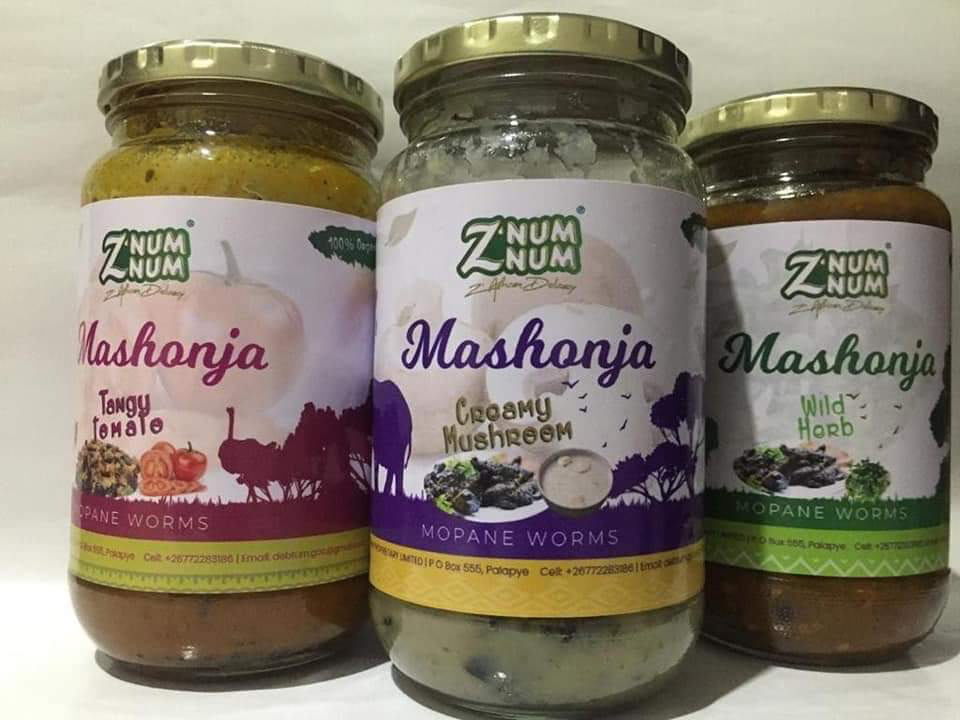The ready-to-eat phane comes in snacks and stew and is so delectable it got a cabinet minister’s tongue extolling its capacity to reduce Botswana’s humongous food import bill of P6.74 billion
GOSEGO MOTSUMI
When harvestable phane in the wild declined considerably in 2018, the harsh reality led local entrepreneur Desmond Munyadzwe to an innovative solution of producing high quality, affordable and ready-to-eat phane that he called Znumnum.
The name is a shortened version of the Kalanga word “zwinamunamu,” which is used about food of great delectation. At that time, the possible extinction of phane would have not only affected the socio-economic status of those who depended on the worm for a living but would also have quite possibly impeded conservation of the species. “Most of all, for me this underlined the need to contribute to food security, create employment and reduce the import bill of processed food,” Munyadzwe says.
In addition to catching the attention of a minister’s tongue, Znumnum has become a topic of discussion online with everyone looking forward to tasting the flavoured phane that is currently being offered through agents in Gaborone, Maun, Francistown and Palapye. Munyadzwe makes two main products – the crunchy roast phane snack and the saucy phane stew variety.
The snacks come in three preparations of the sweet and sticky taste of Thai pot, in tangy tomato and in salty-garlic peri-peri. The saucy stew comes in the tangy-sweet tomato that is suitable for substituting the mince in spaghetti bolognese, the wild herb which gives the natural aroma of herbs but gets down to be hot with peri-peri, and creamy mushroom which gives the relaxing tang of mushroom soup topped with a great salty taste.
“We produce 400 snack packs and 80 bottles per week and we still cannot meet the demand due to lack of industrial equipment, low labour and marketing budgets and limited distribution channels. Our capacity is low at the moment but the stores that we are in negotiations with want at least 200 packs and 100 bottles per day,”says Munyadzwe
The Assistant Minister of Agriculture Development and Food Security, Beauty Manake, has taken note and describes Munyadzwe’s idea as a most disruptive one. “The local food processing company ensures our value chain, food import substitution, and most importantly, it is a nutritional food export commodity,” she commented online. “Remember that our import bill for processed and value added foods stands at P6.74 billion annually. This is exemplary and our chance to occupy some space within our economy.”
Munyadzwe says their vision is of food processing towards Botswana’s food security and reducing the country’s hefty import bill while creating employment and ensuring sustainable beneficiation of natural resources. “We are targeting both the local and the international market with these value added phane products,” he notes.
“The United Nations Food and Agriculture Organization is projecting that the world will depend on insect protein for sustainable nutrition in less than 30 years and the market of the insect protein business is estimated at over P1.6 billion by 2025. So this is the opportunity to be an early adapter and a pioneer of insect protein in Botswana, Africa and the world.”
With their production based in Palapye, they have done several phane-breeding experiments for two years now, pending funding to scale up. Munyadzwe says even though it is a capital-intensive project, the return on investment is “very high” with a cost-benefit ratio of more than 3:4. Phane farming is targeting sustainable and reliable production to do that and they control the breeding process to ensure high yields and productivity of the process inside a farm facility.
This is enabled by ensuring that the conversion rate of burrowed phane to the ‘butterfly’ stage is increased by 40% compared to the phane that burrows in the wild and is susceptible to uncontrolled pests and diseases. Next is to have a conversion rate of more than 29% from eggs laid by the ‘butterfly’ to hatching into baby phane worms. Finally, they ensure that only fully grown phane worms are harvested, unlike in the wild where there is competition to harvest the most worms.
“We invite investors around Botswana and beyond to take up this opportunity of a billion dollar market,” says Munyadzwe.

